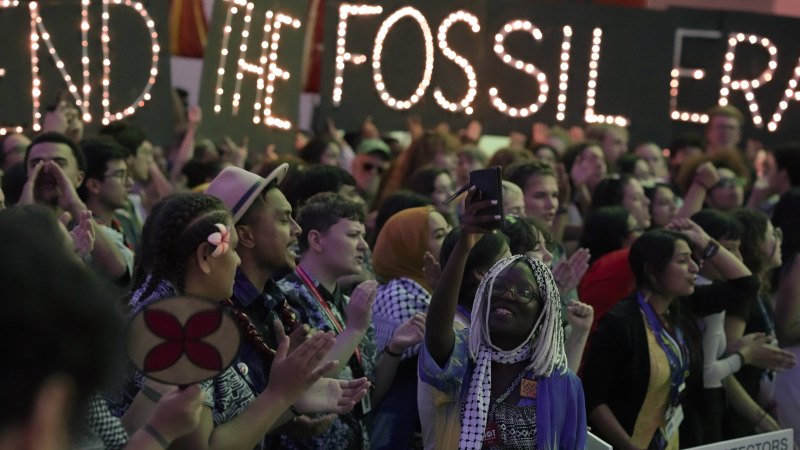‘Riddled with compromise’: COP28 text backs transition from fossil along with nuclear

Save articles for later
Add articles to your saved list and come back to them any time.
Dubai: Negotiators at the COP28 climate talks are poring over a new draft text of a possible agreement, which compromises between nations seeking a declaration that would phase out fossil fuels and petrostates who have fought to keep such language out of the agreement.
Before the COP began, a growing majority of countries had wanted the final agreement to call on all states to phase out fossil fuels this decade to put the planet on a path to 1.5 degrees of warming.
Climate activists protest at the COP28 summit this week.Credit: AP
But after early negotiations, a draft text appeared that stripped most such references from the document, prompting another furious round of overnight negotiations.
The new text “recognises the need for deep, rapid and sustained reductions in greenhouse gas emissions in line with 1.5 degrees pathways”.
It calls on parties to the United Nations climate treaty to “contribute to the following global efforts” including tripling renewable energy capacity and doubling the global average rate of energy efficiency improvements.
It includes a line calling for parties to “transition away from fossil fuels in energy systems, in a just, orderly and equitable manner, accelerating action this decade”.
The latest draft text is expected to be put to the conference in Dubai in the coming hours. Credit: Getty
But it also includes approaches for decarbonisation “renewables, nuclear, abatement and removal technologies such as carbon capture and utilisation and storage, particularly in hard-to-abate sectors”.
The inclusion of references to carbon capture and storage and storage and abatement has disappointed and even angered nations and observers who believe those technologies are used as a greenwash to extend the life of fossil fuels.
Climate scientist Bill Hare, chief of climate analysis and policy think tank Climate Analytics, described the document as “riddled with compromise” and said it failed to put the world on a path to holding warming to 1.5 degrees, which the COP’s United Arab Emirates presidency said has described as the meeting’s “north star”.
He said that a reference to the use of gas as a “transitional fuel” has been promoted by LNG and gas exporters, but he said overall it was an improvement on the previous text.
The reference to “transition away from fossil fuels in energy systems” echoes language used by Australian Climate Change and Energy Minister Chris Bowen in a crisis meeting at the conference, and echoes a statement endorsed by Australia and its Pacific neighbours at the recent Pacific Islands Forum meeting.
Bowen used the language in an effort to keep the intent of “phase down” language intact even if some nations refused to consider endorsing the specific words.
In a statement, the Association of Small Island States welcomed references to science-based targets but said the new text still did not put the planet on a path to 1.5 degrees.
Joseph Sikulu, Pacific director for the climate activist group 350.org, described the proposed agreement as a death sentence and said he hoped island states would walk away from the process.
Tom Evans, a policy advisor with think tank E3G, said that if the language was adopted it would show a collective recognition that the world must quickly turn away from fossil fuels.
“Champions for this vision – both small island states and major economies – have worked tirelessly overnight. However, it is clear that not everyone is ready to admit the truth of what’s needed. This text alone might help avoid disaster in Dubai, but it does not avoid disaster for the planet.”
It is expected the draft will be put to the conference in the coming hours.
The writer’s travel to Dubai was supported by Climate Action Network Australia.
Get to the heart of what’s happening with climate change and the environment. Sign up for our fortnightly Environment newsletter.
Most Viewed in Environment
From our partners
Source: Read Full Article

